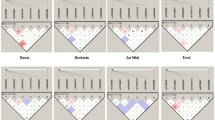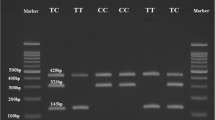Abstract
The ubiquitin-proteasome system (UPS), a key player of proteostasis network in the body, was implicated in type 1 diabetes mellitus (T1DM) pathogenesis. Polymorphisms in genes encoding proteasome subunits may potentially affect system efficiency. However, data in this field are still limited. To fulfil this gap, single nucleotide polymorphisms in the PSMB5 (rs11543947), PSMA6 (rs2277460, rs1048990), PSMC6 (rs2295826, rs2295827) and PSMA3 (rs2348071) genes were genotyped on susceptibility to T1DM in Latvians. The rs11543947 was found to be neutral and other loci manifested disease susceptibility, with rs1048990 and rs2348071 being the most significantly associated (P < 0.001; OR 2.042 [1.376–3.032] and OR 2.096 [1.415–3.107], respectively). Risk effect was associated with female phenotype for rs2277460 and family history for rs2277460, rs2295826 and rs2295827. Five-locus genotypes being at risk simultaneously at any two or more loci showed strong (P < 0.0001) T1DM association. The T1DM protective effects (P < 0.001) were shown for five-locus genotype and haplotype homozygous on common alleles and composed of common alleles, respectively. Using SNPexp data set, correlations have been revealed between the rs1048990, rs2295826, rs2295827 and rs2348071 T1DM risk genotypes and expression levels of 14 genes related to the UPS and 42 T1DM-susceptible genes encoding proteins involved in innate and adaptive immunity, antiviral response, insulin signalling, glucose–energy metabolism and other pathways implicated in T1DM pathogenesis. Genotype–phenotype and genotype–genotype clusterings support genotyping results. Our results provide evidence on new T1DM-susceptible loci in the PSMA3, PSMA6 and PSMC6 proteasome genes and give a new insight into the T1DM pathogenesis.




Similar content being viewed by others
References
Aghdam SY, Sheibani N (2013) The ubiquitin-proteasome system and microvascular complications of diabetes. J Ophthalmic Vis Res 8(3):244–256
Bakay M, Pandey R, Hakonarson H (2013) Genes involved in type 1 diabetes: an update. Genes (Basel) 4(3):499–521. doi:10.3390/genes4030499
Barbieri M, Marfella R, Rizzo MR, Boccardi V, Siniscalchi M, Schiattarella C, Sicilianoc S, Lemmeb P, Paolisso G (2008) The -8 UTR C/G polymorphism of PSMA6 gene is associated with susceptibility to myocardial infarction in type 2 diabetic patients. Atherosclerosis 201(1):117–123. doi:10.1016/j.atherosclerosis.2008.01.005
Bastian M, Heymann S, Jacomy M (2009) Gephi: an open source software for exploring and manipulating networks. In: International AAAI conference on weblogs and social media
Baxter AG, Jordan M (2012) from markers to molecluar mechanisms: type 1 diabetes in the post-GWAS era. Rev Diabet Stud 9(4):201–223. doi:10.1900/RDS.2012.9.201
Bitti ML, Saccucci P, Capasso F, Piccinini S, Angelini F, Rapini N, Arcano M, Arcano S, Petrelli A, Del Duca E, Bottini E, Gloria-Bottini F (2011) Genotypes of p53 codon 72 correlate with age at onset of type 1 diabetes in a sex-specific manner. J Pediatr Endocrinol Metab 24(7–8):437–439
Broca C, Varin E, Armanet M, Tourrel-Cuzin C, Bosco D, Dalle S, Wojtusciszyn A (2014) Proteasome dysfunction mediates high glucose-induced apoptosis in rodent beta cells and human islets. PLoS One 9(3):e92066. doi:10.1371/journal.pone.0092066
Egerer K, Kuckelkorn U, Rudolph PE, Rückert JC, Dörner T, Burmester GR, Kloetzel PM, Feist E (2002) Circulating proteasomes are markers of cell damage and immunologic activity in autoimmune diseases. J Rheumatol 29(10):2045–2052
Freudenburg W, Gautam M, Chakraborty P, James J, Richards J, Salvatori AS, Baldwin A, Schriewer J, Buller ML, Corbett JA, Skowyra D (2013) Immunoproteasome activation during early antiviral response in mouse pancreatic β-cells: new insights into auto-antigen generation in type I diabetes? J Clin Cell Immunol 4(2):pii: 141
Henseleit KD, Nelson SB, Kuhlbrodt K, Hennings JC, Ericson J, Sander M (2005) NKX6 transcription factor activity is required for alpha- and beta-cell development in the pancreas. Development 132(13):3139–3149
Hofmeister-Brix A, Lenzen S, Baltrusch S (2013) The ubiquitin-proteasome system regulates the stability and activity of the glucose sensor glucokinase in pancreatic β-cells. Biochem J 456(2):173–184. doi:10.1042/BJ20130262
Holm K, Melum E, Franke A, Karlsen TH (2010) SNPexp—a web tool for calculating and visualizing correlation between HapMap genotypes and gene expression levels. BMC Bioinform 11:600. doi:10.1186/1471-2105-11-600
Im SS, Kwon SK, Kim TH, Kim HI, Ahn YH (2007) Regulation of glucose transporter type 4 isoform gene expression in muscle and adipocytes. IUBMB Life 59(3):134–145
Jaisson S, Gillery P (2014) Impaired proteostasis: role in the pathogenesis of diabetes mellitus. Diabetologia 57(8):1517–1527
Jean-Philippe J, Paz S, Caputi M (2013) hnRNP A1: the Swiss army knife of gene expression. Int J Mol Sci 14(9):18999–19024. doi:10.3390/ijms140918999
Kalnina J, Paramonova N, Sjakste N, Sjakste T (2014) Study of association between polymorphisms in the PSMB5 (rs11543947) and PSMA3 (rs2348071) genes and multiple sclerosis in Latvians. Biopolym Cell 30(4):305–309
Kim HK, Kim SW, Doh YJ, Kim SR, Kim MK, Park KG, Kim HS, Park KS, Yoo M, Kim JG, Kim BW, Lee IK (2008) Association of the polymorphisms in the PSMA6 (rs1048990) and PSMB5 (rs2230087) genes with type 2 diabetes in Korean subjects. Korean Diabetes J 32(3):204–214. doi:10.4093/kdj.2008.32.3.204
Kitiphongspattana K, Mathews CE, Leiter EH, Gaskins HR (2005) Proteasome inhibition alters glucose-stimulated (pro)insulin secretion and turnover in pancreatic{beta}-cells. J Biol Chem 280(16):15727–15734
Kupca S, Sjakste T, Paramonova N, Sugoka O, Rinkuza I, Trapina I, Daugule I, Sipols JA, Rumba-Rozenfelde I (2013) Association of obesity with proteasomal gene polymorphisms in children. J Obes 2013:638154. doi:10.1155/2013/638154
Leng S, Zhang W, Zheng Y, Liberman Z, Rhodes CJ, Eldar-Finkelman H, Sun XJ (2010) Glycogen synthase kinase 3 beta mediates high glucose-induced ubiquitination and proteasome degradation of insulin receptor substrate 1. J Endocrinol 206(2):171–181. doi:10.1677/JOE-09-0456
Lewis CM (2002) Genetic association studies: design, analysis and interpretation. Brief Bioinform 3(2):146–153
Li Z, Zhang H, Dong X, Burczynski FJ, Choy P, Yang F, Liu H, Li P, Gong Y (2010) Proteomic profile of primary isolated rat mesangial cells in high-glucose culture condition and decreased expression of PSMA6 in renal cortex of diabetic rats. Biochem Cell Biol 88(4):635–648. doi:10.1139/O09-185
Librado P, Rozas J (2009) DnaSP v5: a software for comprehensive analysis of DNA polymorphism data. Bioinformatics 25(11):1451–1452. doi:10.1093/bioinformatics/btp187
Nishida Y, Aida K, Kihara M, Kobayashi T (2014) Antibody-validated proteins in inflamed islets of fulminant type 1 diabetes profiled by laser-capture microdissection followed by mass spectrometry. PLoS One 9(10):e107664. doi:10.1371/journal.pone.0107664
Ozaki K, Sato H, Iida A, Mizuno H, Nakamura T, Miyamoto Y, Takahashi A, Tsunoda T, Ikegawa S, Kamatani N, Hori M, Nakamura Y, Tanak T (2006) A functional SNP in PSMA6 confers risk of myocardial infarction in the Japanese population. Nat Genet 38(8):921–925
Paramonova N, Kupca S, Rumba-Rozenfelde I, Sjakste N, Sjakste T (2014a) Association between the PSMB5 and PSMC6 genetic variations and children obesity in the Latvian population. Biopolym Cell 30(6):477–780
Paramonova N, Wu LS-S, Rumba-Rozenfelde I, Wang JY, Sjakste N, Sjakste T (2014b) Genetic variants in the PSMA6, PSMC6 and PSMA3 genes associated with childhood asthma in Latvian and Taiwanese populations. Biopolym Cell 30(5):377–387
Petrovic J, Hall H, Mehr R, Glas R, Höglund P (2004) Inhibition of the proteasome reduces transfer-induced diabetes in nonobese diabetic mice. Scand J Immunol 60(1–2):134–142
Precechtelova J, Borsanyiova M, Sarmirova S, Bopegamage S (2014) Type I diabetes mellitus: genetic factors and presumptive enteroviraletiology or protection. J Pathog 2014:738512. doi:10.1155/2014/738512
Qi Z, He J, Zhang Y, Shao Y, Ding S (2011) Exercise training attenuates oxidative stress and decreases p53 protein content in skeletal muscle of type 2 diabetic Goto-Kakizaki rats. Free Radic Biol Med 50(7):794–800. doi:10.1016/j.freeradbiomed.2010.12.022
Santin I, Eizirik DL (2013) Candidate genes for type 1 diabetes modulate pancreatic islet inflammation and β-cell apoptosis. Diabetes Obes Metab 15(Suppl 3):71–81. doi:10.1111/dom.12162
Shin S, Le Lay J, Everett LJ, Gupta R, Rafiq K, Kaestner KH (2014) CREB mediates the insulinotropic and anti-apoptotic effects of GLP-1 signaling in adult mouse β-cells. Mol Metab 3(8):803–812. doi:10.1016/j.molmet.2014.08.001
Sivakumaran S, Agakov F, Theodoratou E, Prendergast JG, Zgaga L, Manolio T, Igor Rudan I, McKeigue P, Wilson JF, Campbell H (2011) Abundant pleiotropy in human complex diseases and traits. Am J Hum Genet 89(5):607–618. doi:10.1016/j.ajhg.2011.10.004
Sjakste T, Poudziunas I, Ninio E, Perret C, Pirags V, Nicaud V, Lazdins M, Evans A, Morrison C, Cambien F, Sjakste N (2007) SNPs of PSMA6 gene–investigation of possible association with myocardial infarction and type 2 diabetes mellitus. Genetika 43(4):553–559
Sjakste T, Paramonova N, Rumba-Rozenfelde I, Trapina I, Sugoka O, Sjakste N (2014a) Juvenile idiopathic arthritis subtype- and sex-specific associations with genetic variants in the PSMA6/PSMC6/PSMA3 gene cluster. Pediatr Neonatol 55(5):393–403. doi:10.1016/j.pedneo.2014a.01.007
Sjakste T, Paramonova N, Wu LS, Zemeckiene Z, Sitkauskiene B, Sakalauskas R, Wang JY, Sjakste N (2014b) PSMA6 (rs2277460, rs1048990), PSMC6 (rs2295826, rs2295827) and PSMA3 (rs2348071) genetic diversity in Latvians, Lithuanians and Taiwanese. Meta Gene 2:283–298. doi:10.1016/j.mgene.2014b.03.002
Wang H, Jiang M, Zhu H, Chen Q, Gong P, Lin J, Lu J, Qiu J (2013) Quantitative assessment of the influence of PSMA6 variant (rs1048990) on coronary artery disease risk. Mol Biol Rep 40(2):1035–1041. doi:10.1007/s11033-012-2146-2
Wilfinger A, Arkhipova V, Meyer D (2013) Cell type and tissue specific function of islet genes in zebrafish pancreas development. Dev Biol 378(1):25–37. doi:10.1016/j.ydbio.2013.03.009
Workeneh B, Bajaj M (2013) The regulation of muscle protein turnover in diabetes. Int J Biochem Cell Biol 45(10):2239–2244. doi:10.1016/j.biocel.2013.06.028
Wu ZH, Shi Y (2013) When ubiquitin meets NF-κB: a trove for anti-cancer drug development. Curr Pharm Des 19(18):3263–3275
Zhao Y, Krishnamurthy B, Mollah ZU, Kay TW, Thomas HE (2011) NF-κB in type 1 diabetes. Inflamm Allergy Drug Targets 10(3):208–217
Acknowledgments
Cost of this work was covered from the European Social Foundation Project No 2013/0043/1DP/1.1.1.2.0/13/APIA/VIAA/002. We thank Dr. L. Nikitina-Zake (Latvian Biomedical Research Centre) for help and advices in T1DM sample selection from the Genome database of the Latvian population.
Author information
Authors and Affiliations
Corresponding author
Ethics declarations
Conflict of interest
The authors declare that they have no conflict of interest.
Ethical approval
All procedures performed in studies involving human participants were in accordance with the ethical standards of the Central Medical Ethics Committee of Latvia (Protocol Nr. 01-29.1/17) and with the 1964 Helsinki declaration and its later amendments or comparable ethical standards.
Informed consent
Informed consent was obtained from all individual participants included in the study.
Additional information
Communicated by Q. Wang.
Electronic supplementary material
Below is the link to the electronic supplementary material.
Rights and permissions
About this article
Cite this article
Sjakste, T., Paramonova, N., Osina, K. et al. Genetic variations in the PSMA3, PSMA6 and PSMC6 genes are associated with type 1 diabetes in Latvians and with expression level of number of UPS-related and T1DM-susceptible genes in HapMap individuals. Mol Genet Genomics 291, 891–903 (2016). https://doi.org/10.1007/s00438-015-1153-0
Received:
Accepted:
Published:
Issue Date:
DOI: https://doi.org/10.1007/s00438-015-1153-0




